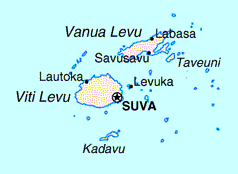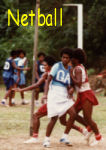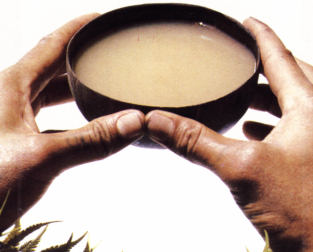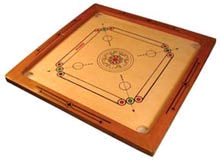

 |
 |
| Radio | The music on the radio is right up to date with the US.
We get every kind of music from many different countries including NZ, Australia and Britain. What I like best is
the British comedies and quiz shows such as: "My Word" [audio (4.5Mb)], "Just a Minute" [audio (24Mb)] "Take It From Here" [audio (7Mb)] (with the Glums [audio (12Mb)]) "Who's Line is it Anyway", Stop Messing About [audio (5Mb)] I'm Sorry I'll Read That Again [long live Kenneth Williams]. They are continually announcing one song and playing another. Example: "On the Blue Missouri" then played "Exodus".
| |
| -------------- | ||
| Conflict | From a letter dated Apr 12, 1970: "...small amount due to the different backgrounds. Fijians are fun-loving people, share everything and work when they need to do so on a subsistence level. Indians are deeply religious and very strict within their culture. They work long hours and hoarde money and like to have status things. The Hindis believe in education and work hard at it and so they get the jobs. Fijians don't mind. But a time will come when the Fijians will want the jobs, the money, the power and then something bad will happen [ed. coup in 1987 when Indians gained political power]. The Fijians own all of the land and by law other races can't buy it, only lease it. As leases run out they won't be renewed, so the Indians will be forced out of agriculture and into the cities. Cash crops could then become a thing of the past". | |
| -------------- | ||
| Cashing a Cheque | Someone gives you a personal check. Go to their bank and stand in line at the window of the person's surname. The teller will check to see if there are sufficient funds by going to record books. This can take some time. If there is enough money, the check is endorsed and you then go to another area of the bank where you wait in an even longer line to get the cash. And while you are in line do you notice that all of the managers are white and that the clerks are Indian? | |
| -------------- | ||
| Sports |  Fiji is going to send Saimoni to the Commonwealth Games.
He is Fiji's fastest runner. In races here he gives opponents 20-40 yd leads and usually wins. He set a new
record for the 440 - 48.1 sec - only 8 seconds off the world record.
Feb 71: "The boys only think about Clay-Frazier these days - graffiti is rife. Not just the boys, but the whole culture has a worship of physical might. A rugby player is the elite in Fiji.
Thinkers and desk men are pretty low on the ladder". Fiji is going to send Saimoni to the Commonwealth Games.
He is Fiji's fastest runner. In races here he gives opponents 20-40 yd leads and usually wins. He set a new
record for the 440 - 48.1 sec - only 8 seconds off the world record.
Feb 71: "The boys only think about Clay-Frazier these days - graffiti is rife. Not just the boys, but the whole culture has a worship of physical might. A rugby player is the elite in Fiji.
Thinkers and desk men are pretty low on the ladder". | |
| -------------- | ||
| Yaqona |  A drink made from the roots of the kava bush. The dried roots are ground into a powder, then
mixed with water (in a tanoa), strained and drunk from a bilo. It's nothing special, tastes like tree bark, has no kick but it is the social thing to do for Fijians.
In their simple world they spend most of their time sitting around talking about the weather or something and drink the yaqona. Even the Indians have caught on to the habit -
a western "coffee break" is a Fijian "kava break". Indians like their grog on the green side which has a bitter taste. [audio explanation done in 1970 (3Mb)] A drink made from the roots of the kava bush. The dried roots are ground into a powder, then
mixed with water (in a tanoa), strained and drunk from a bilo. It's nothing special, tastes like tree bark, has no kick but it is the social thing to do for Fijians.
In their simple world they spend most of their time sitting around talking about the weather or something and drink the yaqona. Even the Indians have caught on to the habit -
a western "coffee break" is a Fijian "kava break". Indians like their grog on the green side which has a bitter taste. [audio explanation done in 1970 (3Mb)] | |
| -------------- | ||
| Tobacco |  Western cigarettes are expensive, and as a rule, in villages, it was that women, young and old, smoked the local tobacco. Wicked, strong stuff that comes in a coil that resembles rope.
You ask for 10¢ worth and the guy cuts off so many inches. You peel off some oily leaves and roll them up in newspaper.
New Zealand newspaper is preferred, but is hard to come by, as the Fiji Times' ink comes off leaving black teeth and lips.
Western cigarettes are expensive, and as a rule, in villages, it was that women, young and old, smoked the local tobacco. Wicked, strong stuff that comes in a coil that resembles rope.
You ask for 10¢ worth and the guy cuts off so many inches. You peel off some oily leaves and roll them up in newspaper.
New Zealand newspaper is preferred, but is hard to come by, as the Fiji Times' ink comes off leaving black teeth and lips. | |
| -------------- | ||
| Games | Rounders Take an axe handle, hit a softball and run. If you get hit by the ball before you reach a sanctuary. If a runner makes it around all of the sanctuaries and get to the castle (home) the team gets a run. | |
| Bona Look a person in the eyes and say "Bona". You must turn your eyes away immediately before the person can "Bona" you back. | ||
Sela  Take four shells.
Each person rolls like dice until he gets all four up or all four down. Then he can start accumlating points. Each four up is 8 points,
four down is 4 points. In other cases, the person must be able to put a finger between two shells then flick one to hit the other for a point.
He keeps going until he misses a flick or moves a shell. A miss all (0 points) happens when during a flick one of the other two shells is hit.
If two shells touch he can call for a "bump" and another player drops a shell on them. First to 50 points wins. Take four shells.
Each person rolls like dice until he gets all four up or all four down. Then he can start accumlating points. Each four up is 8 points,
four down is 4 points. In other cases, the person must be able to put a finger between two shells then flick one to hit the other for a point.
He keeps going until he misses a flick or moves a shell. A miss all (0 points) happens when during a flick one of the other two shells is hit.
If two shells touch he can call for a "bump" and another player drops a shell on them. First to 50 points wins. | ||
Carrom  Take four shells.
Carrom pieces (coins) are identical to checkers and are 'flicked' with the 'striker,' like the cue ball in pool. Carrom is played on a wooden board with four pockets. The object of the game is to sink all of your pieces before your oppononent sinks theirs.
Similar to the game, Skelly, I played in my youth using bottle caps. Take four shells.
Carrom pieces (coins) are identical to checkers and are 'flicked' with the 'striker,' like the cue ball in pool. Carrom is played on a wooden board with four pockets. The object of the game is to sink all of your pieces before your oppononent sinks theirs.
Similar to the game, Skelly, I played in my youth using bottle caps. | ||
| -------------- | ||
| Hindi Women | The love to scream in a very high pitch squeak. First noticed it when staying at Cuvu where Achim's mother would call his name all day long. Later when living next to the Rams it was the same. Hindi men are quiet spoken and rarely raise their voice. Probably because they rule the roost and automatically get respect. We figured that the women have all this pent up frustration do to the "slave" type role they are burdened with in their society. | |
| -------------- | ||
| Folklore | Tulo Captain Cook landed in Kadavu and had one his mates go to the top of a hill with
some experimental equipment. The hill wasn't high enough, so the mate called down "too low" "too low" very loudly.
Since then Fijians will say "tulo" whenever above another person. Especially say walking past someone seated on floor -
sort of saying "excuse me", but for a specific situation. | |
| Ocean Island The people of Ocean Island were moved to Rabi so island could be stripped of its phospate. A boy told us that his grandmother told him that her father and other on Ocean Island were at a meeting when they heard a bang. It was a meteor and a woman appeared who was about 8ft tall and they assumed that she was a devil. So they got some ropes "If that thing were going to run away then they would tie it up". It didn't breathe or drink whiskey. | ||
| Evil Spot Meli U. was riding home with some friends along the coast. They had to go past a point where something evil happened a logn time ago. One boy's horse froze, tried to turn back and then through the boy. | ||
| Fortune Teller Meli U has a relative who is a fortune teller and she always drinks two bowls of kava before starting. One for herself and one for the devil. | ||
| The Tunnel There is suppose to be a tunnel between Rabi and Taveuni. Everyone believes it even though it has never been proven. There is a large hole on each island. | ||
| Evil Spirits They tend to blame everything bad on evil spirits. Even the Methodist minister at this school keeps a light on all night to ward off the evil spirits | ||
| -------------- | ||
| Haircut | You are led into a private room/cubicle, your shoes/sandals are removed and shined, you are offered a cigarette, then you basically get a haircut and shampoo, top the whole thing off with a shave. And for all this luxury you pay a whole 25¢. | |
| -------------- | ||
| Kere Kere | The act of "requesting" something, usually with "mada" (please). At QVS there was a fellow (I believe from Qoma) who was called Mr Kere Kere, as he was always bring ing around things to sell, and failing to make a sale he would hen procede to "beg".
|
|
| -------------- | ||
| Telephone |  QVS had a phone in the staff room which was powered by a couple 9V dry cells.
Pick up the receiver and say: "Working?" If someone was using the line you would be told so and you hang up and wait. If the line was clear you then turn the crank which caused the bell to ring on your phone and the operator's, in our case that would be in Korovou.
You give her the number you want and its location. You then hang up and wait for the operator to call back once they have made the connection. QVS had a phone in the staff room which was powered by a couple 9V dry cells.
Pick up the receiver and say: "Working?" If someone was using the line you would be told so and you hang up and wait. If the line was clear you then turn the crank which caused the bell to ring on your phone and the operator's, in our case that would be in Korovou.
You give her the number you want and its location. You then hang up and wait for the operator to call back once they have made the connection.
|
|
| -------------- | ||
| Transport |  The main source for the locals are diesel smoke spewing open window (with tarps for when it rains) buses.
The private owner/driver had much pride in his vehicle and they are kept clean. Which can be a big feat as people carry livestock on board with them. At the city bus depot you get on and wait for departure.
Hawkers come around selling all sorts of things, the main items being hot peas: "Peas! Beans!". The bus that served QVS was owned and driven by Achari. The main source for the locals are diesel smoke spewing open window (with tarps for when it rains) buses.
The private owner/driver had much pride in his vehicle and they are kept clean. Which can be a big feat as people carry livestock on board with them. At the city bus depot you get on and wait for departure.
Hawkers come around selling all sorts of things, the main items being hot peas: "Peas! Beans!". The bus that served QVS was owned and driven by Achari. |
|
| -------------- | ||
| Welcome Ceremony | The dignitaries are seated and the very first thing to offered is yaqona. It is made with much flourish and showmanship in a large tanoa in rhythm to a beating lali. The server then brings a bilo to each personage in order of importance. Following the kava comes the gifts - a pig, dalo, casava, yam (these items are graciously given back and usd for the magiti). Again formal speeches being made according to ritual. A meke or several are then performed. Then the speeches begin, the welcoming speech, the thank you speech and maybe more mekes. Photos | |
| -------------- | ||
| Masi | Also known as tapa cloth. The bark of the mulberry tree is pulped, pounded and dried into a paper-like substance upon which designs are "inked" or stencilled. Styles vary through the islands with the black stencil on white favored in the west and the brown on yellowy freehand in the Lau group (influenced greatly by Tongan tapa). Photos Link. | |
| -------------- | ||
| Hibiscus Festival | An annual event in August where activities center around Albert Park in Suva. There is a Parade which includes a "parade of youth". Photos Link Opening speeches (7Mb) Marching (2Mb) Parade (4Mb) | |
| -------------- | ||
| The Tevutevu | Aug 5, 1972. Attended Neomai's tevutevu. At 3PM we sat in on a grog session and presentation of tabua. Unfortunately, I sat next to the father of the bride (Lenati) and couldn't extricate myself for 5 hours. The Lau contingent did some mekes and the magiti as the actual tevutevu took place. Jonacani V represented Apenisa (the groom who is on a ship somewhere). It was explained to us in English. More grog and mekes by the Kadavu people. | |
| -------------- | ||
| The Firewalk |  Aug 20, 1972. Went to Korovou with Murphys for an Indian firewalking ceremony to honor the goddess Devi. Once the coals were hot enough the whole thing lasted about 15 minutes. Drums were beaten while 12 walkers did the distance. Aug 20, 1972. Went to Korovou with Murphys for an Indian firewalking ceremony to honor the goddess Devi. Once the coals were hot enough the whole thing lasted about 15 minutes. Drums were beaten while 12 walkers did the distance. | |
| -------------- | ||
| The Hindi Festival | Sept 1, 1971. Suva. Met up with Hoffsis at Peking. They were with the Cuvu principal and wife. They brought us to Hindi Festival Night at Albert Park. Crowded. Saw a Maori group and several other acts perform then walked around checking out the stalls. | |
| -------------- | ||
| The Wood Gatherer | Sept 12, 1971. Susi's nephew, Domo had a Feast to celebrate his first firewood collection. | |
| -------------- | ||
| The Meters | ||
| -------------- | ||